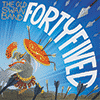
THE OLD SWAN BAND - Fortyfived
WildGoose Studios WGS434CD
Topped and tailed with timeless Irish slides and polkas, the seventh (at least) album from this archetypal English dance band is a bit of a departure as it contains no English tunes at all. Not a single one! Perhaps the closest is Traveller's Joy, a new piece from Shropshire composer Janet May, which has passed into the English session scene but seems to belong to the Welsh Border tradition with more than a hint of the Dark Celts. This jaunty tune follows three pieces from the Debatable Lands, where as any Northumbrian will tell you the music is definitely not English.
Scottish, Swedish, North American and Australian melodies fill the rest of Fortyfived, along with a couple more jewels from the Irish canon: Sonny Brogan's Mazurka, a beautiful melody, and the swaggering Batt Henry's Barn Dance from the 1930s heyday of New York Irish music. Marches, hop-steps, waltzes, jigs, and what passes for reels in English circles are all delivered with panache and with enough punch for the most demanding dancers. Somehow this eight-piece band has managed to combine contemporary finesse and musical tastes (minor keys, more notes, modern rhythms) with the distinctive 70s sound of shakers and tambourines and low brass - and it works perfectly, as shown by the packed halls and perspiring hordes at Old Swan Band performances.
The quality of Fortyfived in terms of mixing and musicianship is as good as ever, benefiting from modern recording techniques and many years of experience. The album title refers to the average age of the Old Swan Band, I'm guessing, or perhaps to the Sanatogen they add to their cornflakes these days. (Other vitamins are available!) Either way, there's plenty of life left in the Old Swan yet, and this CD will delight both dancers and listeners who like their music lively and authentic, wherever it comes from.
www.wildgoose.co.uk
Alex Monaghan
This review appeared in Issue 132 of The Living Tradition magazine
